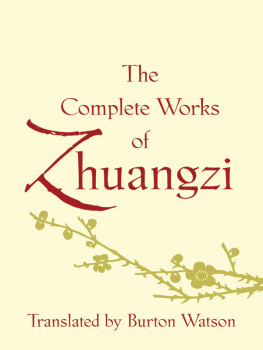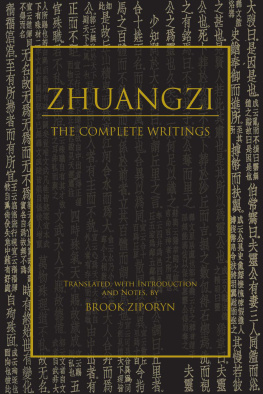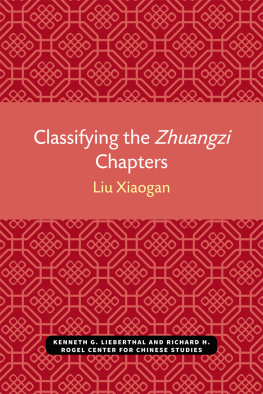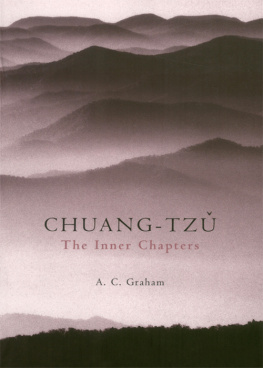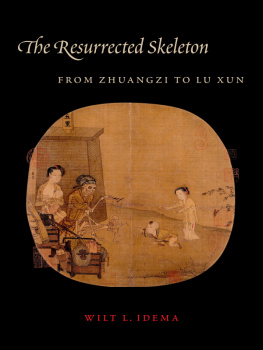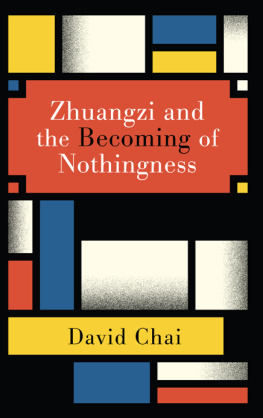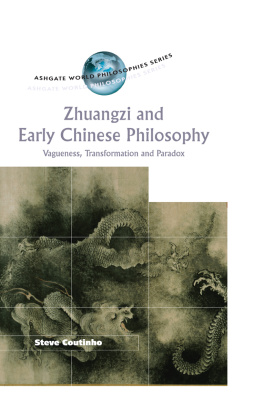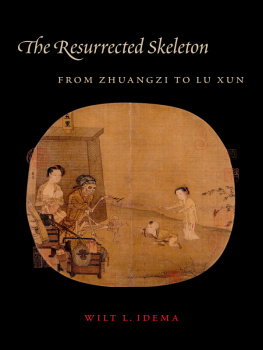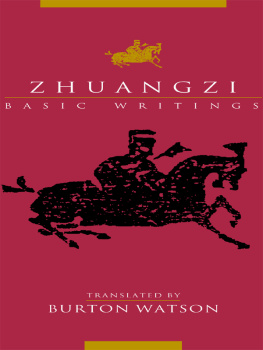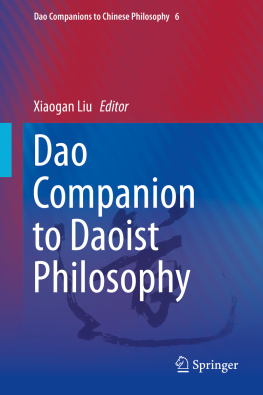THE COMPLETE WORKS OF ZHUANGZI
TRANSLATIONS FROM THE ASIAN CLASSICS
TRANSLATIONS FROM THE ASIAN CLASSICS
Editorial Board
Wm. Theodore de Bary, Chair
Paul Anderer
Donald Keene
George A. Saliba
Haruo Shirane
Burton Watson
Wei Shang
Zhuangzi
THE COMPLETE WORKS OF ZHUANGZI
TRANSLATED BY
Burton Watson
COLUMBIA UNIVERSITY PRESS NEW YORK
COLUMBIA UNIVERSITY PRESS
Publishers Since 1893
NEW YORK CHICHESTER, WEST SUSSEX
cup.columbia.edu
Copyright 2013 Columbia University Press
All rights reserved
E-ISBN 978-0-231-53650-9
Library of Congress Cataloging-in-Publication Data
Zhuangzi.
[Nanhua jing. English]
The Complete works of Zhuangzi / translated by Burton Watson.
p. cm.(Translations from the Asian classics)
Columbia University Press first published Watsons translation as The Complete Works of Chuang Tzu in 1968. Includes bibliographical references and index. ISBN 978-0-231-16474-0 (cloth : alk. paper)
ISBN 978-0-231-53650-9 (e-book)
I. Watson, Burton, 1925 II. Title.
BL1900.C46E5 2013
181.09514dc23
2012047986
Book design by Chang Jae Lee
A Columbia University Press E-book.
CUP would be pleased to hear about your reading experience with this e-book at .
CONTENTS
All we know about the identity of Zhuangzi, or Master Zhuang, are the few facts recorded in the brief notice given him in the Shiji or Records of the Historian (ch. 63) by Sima Qian (145?89? BCE). According to this account, his personal name was Zhou, he was a native of a place called Meng, and he once served as an official in the lacquer garden there. Sima Qian adds that he lived at the same time as King Hui (370319 BCE) of Liang and King Xuan (319301 BCE) of Qi, which would make him a contemporary of Mencius, and that he wrote a work in 100,000 words or more that was mostly in the nature of fable. A certain number of anecdotes concerning Zhuangzi appear in the book that bears his name, though it is difficult, in view of the deliberate fantasy that characterizes the book as a whole, to regard these as reliable biography.
Scholars disagree as to whether lacquer garden is the name of a specific location or simply means lacquer groves in general, and the location of Meng is uncertain, though it was probably in present-day Henan, south of the Yellow River. If this last supposition is correct, it means that Zhuang Zhou was a native of the state of Song, a fact that may have important implications.
When the Zhou people of western China conquered and replaced the Shang or Yin dynasty around the eleventh century BCE, they enfeoffed the descendants of the Shang kings as rulers of the region of Song in eastern Henan, in order that they might carry on the sacrifices to their illustrious ancestors. Though Song was never an important state, it managed to maintain its existence throughout the long centuries of the Zhou dynasty until 286 BCE, when it was overthrown by three of its neighbors and its territory divided up among them. It is natural to suppose that both the ruling house and many of the citizens of Song were descended from the Shang people and that they preserved to some extent the rites, customs, and ways of thought that had been characteristic of Shang culture. The Book of Odes, it may be noted, contains five Hymns of Shang that deal with the legends of the Shang royal family and that scholars agree were either composed or handed down by the rulers of the state of Song. Song led a precarious existence, constantly invaded or threatened by more powerful neighbors, and in later centuries its weakness was greatly aggravated by incessant internal strife. The ruling house of Song possessed a history unrivaled for its bloodiness, even in an age of disorder. Its inhabitants, as descendants of the conquered Shang people, were undoubtedly despised and oppressed by the more powerful states that belonged to the lineage of the Zhou conquerors, and the man of Song appears in the literature of late Zhou times as a stock figure of the ignorant simpleton.
All these facts of Song lifethe preservation of the legends and religious beliefs of the Shang people, the political and social oppression, the despair born of weakness and strifemay go far to elucidate the background from which Zhuangzis thought sprang and to explain why, in its skepticism and mystical detachment, it differs so radically from Confucianism, the basically optimistic and strongly political-minded philosophy that developed in the Zhou lineage states of Lu and Qi. But since we know so little about the life and identity of Zhuang Zhou or his connection with the book that bears his name, it is perhaps best not to seek too assiduously to establish a direct causal connection between the background and the philosophy.
Whoever Zhuang Zhou was, the writings attributed to him bear the stamp of a brilliant and original mind. Instead of speculating on the possible sources from which this mind drew its ideas, let us turn to an examination of the ideas themselves. I shall simply state that from here on, when I speak of Zhuangzi, I am referring not to a specific individual known to us through history but to the mind, or group of minds, revealed in the text called Zhuangzi, particularly the first seven sections of that text.
The central theme of the Zhuangzi may be summed up in a single word: freedom. Essentially, all the philosophers of ancient China addressed themselves to the same problem: how is man to live in a world dominated by chaos, suffering, and absurdity? Nearly all of them answered with some concrete plan of action designed to reform the individual, to reform society, and eventually to free the world from its ills. The proposals put forward by the Confucians, the Mohists, and the Legalists, to name some of the principal schools of philosophy, all are different but all are based on the same kind of commonsense approach to the problem, and all seek concrete social, political, and ethical reforms to solve it. Zhuangzis answer, however, the answer of one branch of the Daoist school, is radically different from these and is grounded on a wholly different type of thinking. It is the answer of a mystic, and in attempting to describe it here in clear and concrete language, I shall undoubtedly be doing violence to its essentially mystic and indescribable nature. Zhuangzis answer to the question is: free yourself from the world.

